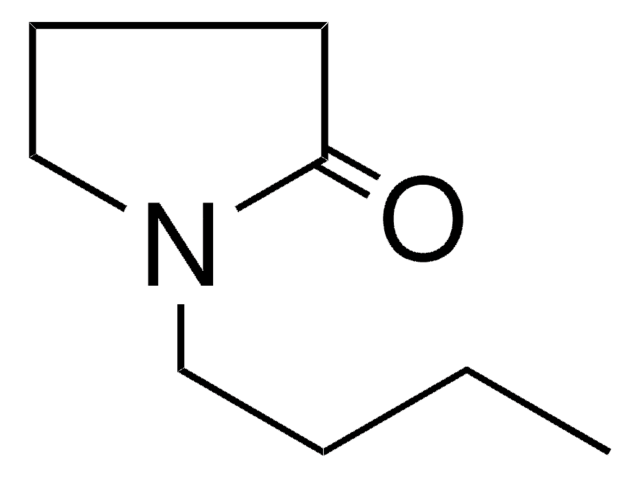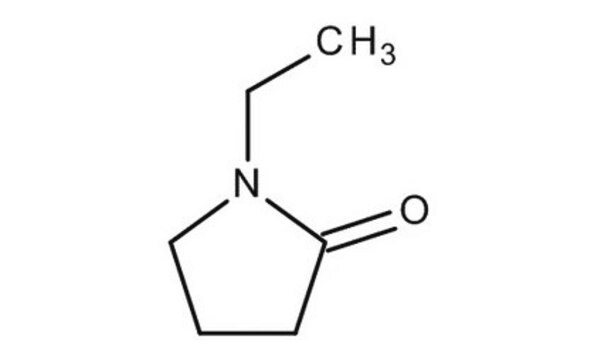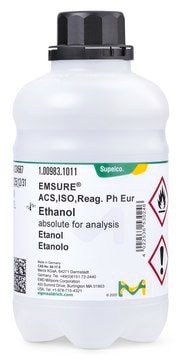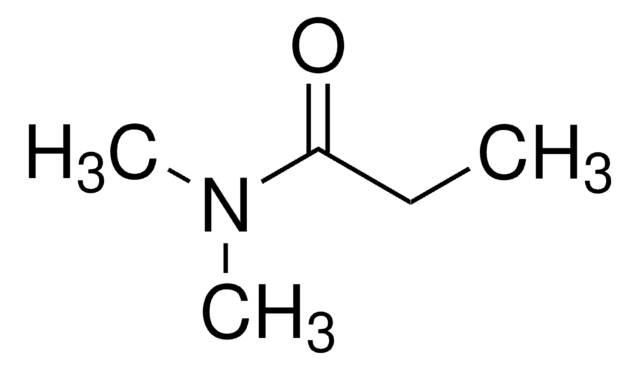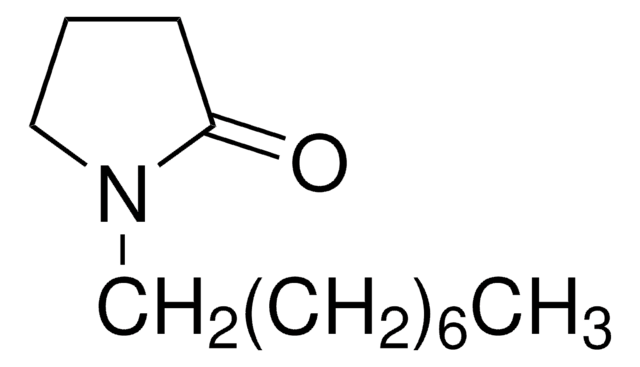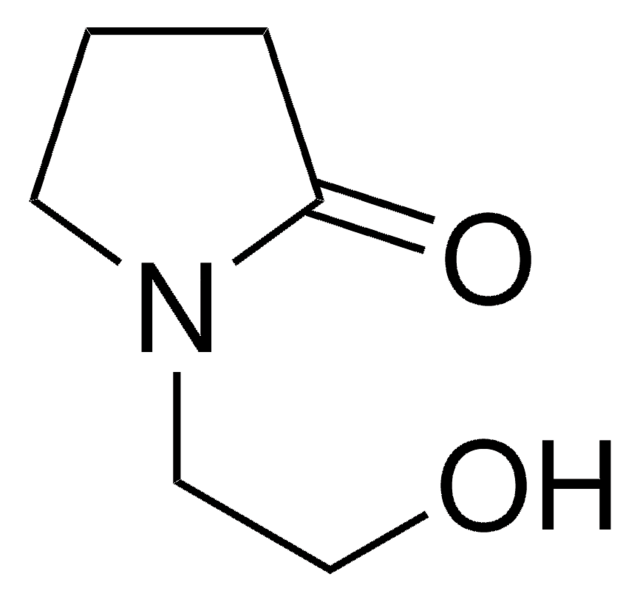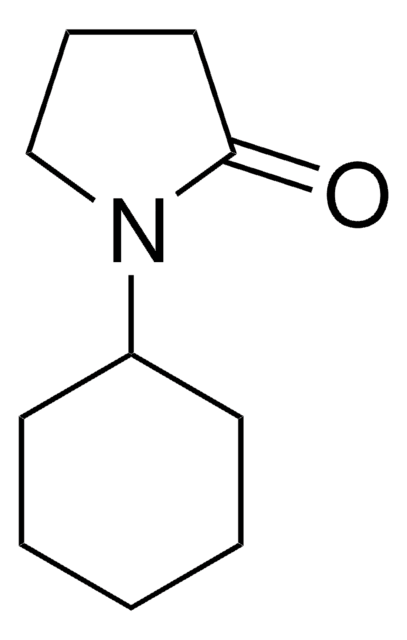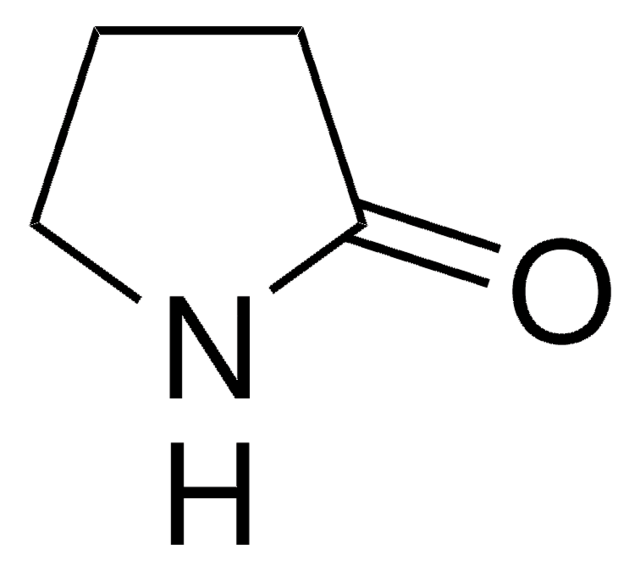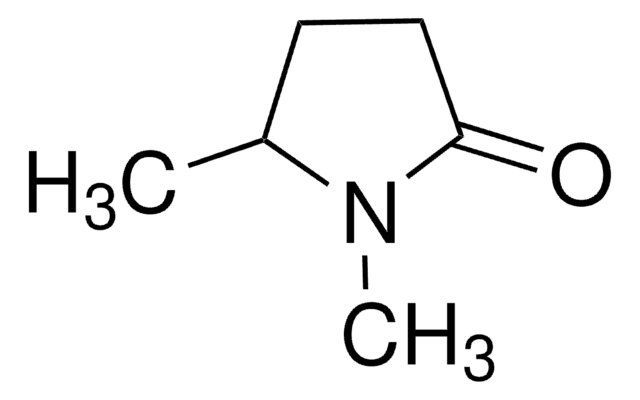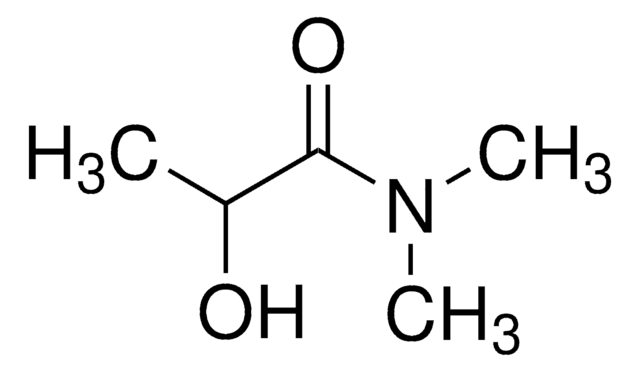All Photos(1)
About This Item
Empirical Formula (Hill Notation):
C6H11NO
CAS Number:
Molecular Weight:
113.16
Beilstein:
107971
EC Number:
MDL number:
UNSPSC Code:
12352100
PubChem Substance ID:
NACRES:
NA.22
Recommended Products
Assay
98%
form
liquid
refractive index
n20/D 1.465 (lit.)
bp
97 °C/20 mmHg (lit.)
density
0.992 g/mL at 25 °C (lit.)
SMILES string
CCN1CCCC1=O
InChI
1S/C6H11NO/c1-2-7-5-3-4-6(7)8/h2-5H2,1H3
InChI key
ZFPGARUNNKGOBB-UHFFFAOYSA-N
Looking for similar products? Visit Product Comparison Guide
General description
1-Ethyl-2-pyrrolidone is a transdermal absorption-enhancing compound and mechanism of its effect on multilammellar liposome of stratum corneum lipid has been studied.
Application
1-Ethyl-2-pyrrolidone was used to modify coir fiber (from Cocos nucifera) by photocuring.
Signal Word
Danger
Hazard Statements
Precautionary Statements
Hazard Classifications
Eye Dam. 1 - Repr. 1B
Storage Class Code
6.1C - Combustible acute toxic Cat.3 / toxic compounds or compounds which causing chronic effects
WGK
WGK 1
Flash Point(F)
195.8 °F - Pensky-Martens closed cup
Flash Point(C)
91 °C - Pensky-Martens closed cup
Personal Protective Equipment
dust mask type N95 (US), Eyeshields, Gloves
Choose from one of the most recent versions:
Already Own This Product?
Find documentation for the products that you have recently purchased in the Document Library.
Customers Also Viewed
Effect of penetration enhancers (pyrrolidone derivatives) on multilamellar liposomes of stratum corneum lipid: a study by UV spectroscopy and differential scanning calorimetry.
Kim C-K, et al.
International Journal of Pharmaceutics, 95(1), 43-50 (1993)
Takeshi Katsuda et al.
Scientific reports, 3, 1197-1197 (2013-02-05)
Alzheimer's disease (AD) is characterized by the accumulation of β-amyloid peptide (Aβ) in the brain because of an imbalance between Aβ production and clearance. Neprilysin (NEP) is the most important Aβ-degrading enzyme in the brain. Thus, researchers have explored virus-mediated
Ajeet Kaushik et al.
Scientific reports, 7, 45663-45663 (2017-04-05)
In this research, we demonstrate cell uptake of magneto-electric nanoparticles (MENPs) through nanoelectroporation (NEP) using alternating current (ac)-magnetic field stimulation. Uptake of MENPs was confirmed using focused-ion-beam assisted transmission electron microscopy (FIB-TEM) and validated by a numerical simulation model. The
Effect of Pretreatment with Ultraviolet Radiation on the Physicomechanical Properties of Photocured Coir (Cocos nucifera) Fiber with 1-Ethyl-2-Pyrrolidone (1-E-2-P) Monomer.
Khan MA, et al.
Polymer-Plastics Technology and Engineering, 45(4), 487-494 (2006)
Xiaolei Zhu et al.
Aging cell, 16(5), 1073-1082 (2017-08-05)
The accumulation and deposition of beta-amyloid (Aβ) is a key neuropathological hallmark of Alzheimer's disease (AD). Histone deacetylases (HDACs) are promising therapeutic targets for the treatment of AD, while the specific HDAC isoforms associated with cognitive improvement are poorly understood.
Our team of scientists has experience in all areas of research including Life Science, Material Science, Chemical Synthesis, Chromatography, Analytical and many others.
Contact Technical Service